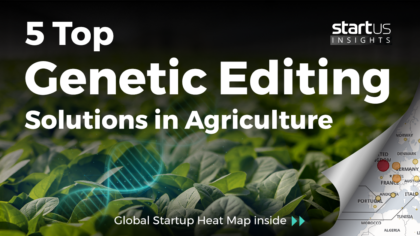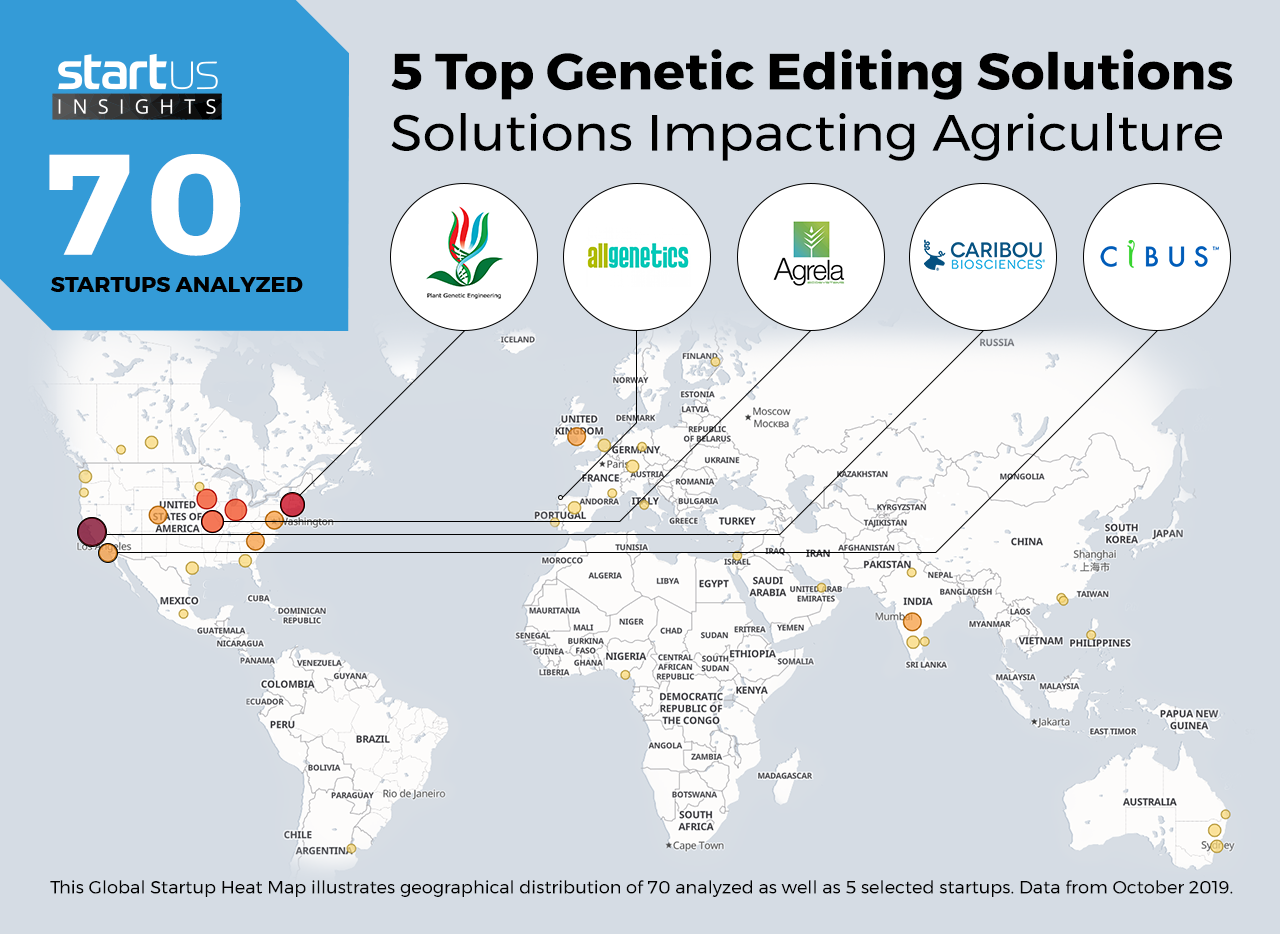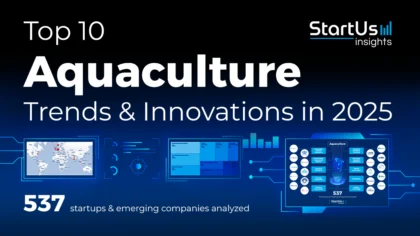Accelerate Productivity in 2025
Reignite Growth Despite the Global Slowdown
Our Innovation Analysts recently looked into emerging technologies and up-and-coming startups working on solutions for the agriculture industry. As there is a large number of startups working on a wide variety of solutions, we decided to share our insights with you. This time, we are taking a look at 5 promising Genetic Editing Solutions.
Heat Map: 5 Top Genetic Editing Solutions
For our 5 top picks, we used a data-driven startup scouting approach to identify the most relevant solutions globally. The Global Startup Heat Map below highlights 5 interesting examples out of 70 relevant solutions. Depending on your specific needs, your top picks might look entirely different.
Caribou Biosciences – Gene Editing Using CRISPR Technology
Genetic editing is not a new concept, but rather a continuously evolving concept. Early techniques of editing were random and difficult to control. The discovery of the protein called CAS9 (Crispr-ASsociated), which can cut through DNA strands, gave genetics its breakthrough. Today, using this technology, precise gene editing can be done with limited random outcomes. The US-based startup Caribou Biosciences develops precision breeding strategies to speed up and streamline the processes for the generation of new crop traits, such as drought tolerance and disease resistance, to protect plant health and increase yields using CRISPR technology. In addition, this technology can be useful in providing genetic and genomic analysis as more and more crop genomes get sequenced.
Cibus – Gene Editing Using Rapid Trait Development System (RTDS)
Another technology developed to overcome the deficiencies of traditional editing techniques is RTDS. It has been developed to specifically tackle the fallout of transgenics, where a new trait is introduced but without having the ability to control it. RTDS allows for high precision in implementing these new traits to existing DNA. With more control over the editing process, this technology does not share the controversies of transgenics. The US-based company Cibus develops RTDS, a company trademark, that accelerates the processes underlying natural breeding and provides a versatile way to increase crop yields for farmers, improve nutrition for consumers, and reduce wastage at the production stage of agriculture. Moreover, RTDS is non-transgenic in both process and product.
Plant Genetic Engineering – Enhanced Nitrogen Fixation
The latest consumer trend impacting agriculture is buying produce which contains zero fertilizers with low levels of chemicals. But for the farmer, not using fertilizers, especially in medium to large-sized farms, will result in heavy crop losses. Fertilizers are added to the soil to ward off pests and weeds while giving the crops valuable chemicals like nitrogen. Genetic editing techniques have found a way to solve this conundrum. The US-based startup Plant Genetic Engineering develops genetic editing techniques that will enable a plant or crop to directly absorb nitrogen from the atmosphere, eliminating the need for using fertilizers. They have currently achieved a stable tobacco seed using transgenics, which can convert nitrogen from the atmosphere into ammonia, making it independent of the nitrogen content in the soil. This allows farmers to significantly reduce the use of chemicals for growing crops.
Allgenetics – Genomic Sequencing Using SNPs
Before any gene editing can happen, the entire genome of a crop or animal has to be mapped. This is done using quantitative trait loci (QTL), which is a molecular marker that is directly correlated to a physical trait of a plant or an organism. Traditional marker-assisted editing is efficient only if the selected QTL contributes to large changes in the phenotypic variation of the crop. This molecular marker is rapidly being replaced by single-nucleotide polymorphisms (SNPs) because of their high level of polymorphism and reproducibility. Spanish startup Allgenetics offers an SNPs genotyping service that is tailored to the genetic improvement of crops and plant breeding. They are able to identify thousands of SNPs among breeding lines, varieties, or cultivars of a crop species in an efficient and cost-effective manner. This precise editing technique can potentially allow farmers to grow only those seeds which have good traits to maturity while cross-breeding or not seeding the others.
Agrela Ecosystems – Automated Phenotyping
Phenotype is all the physical and observable characteristics of any individual. Phenotyping of crops relates to the process of predicting the crop’s phenotype using only genetic information collected through genome sequencing or genotyping. To manually catalog all observable characteristics of all crops on a farm may not even be entirely possible. Advances in automation technologies allow for automated phenotyping, which will significantly impact the editing of crop genes using genomic sequencing. The US-based startup Agrela Ecosystems design and develop PheNode, a modular energy-efficient, smart, field-deployable, and solar-powered environment sensing and phenotyping station. PheNode is a tool for farmers that can monitor environmental conditions and transmit the data to the cloud, where they can track their crops in real-time, in order to facilitate data-driven decision support.
What About The Other 65 Solutions?
While we believe data is key to creating insights it can be easy to be overwhelmed by it. Our ambition is to create a comprehensive overview and provide actionable innovation intelligence for your Proof of Concept (PoC), partnership, or investment targets. The 5 startups showcased above are promising examples out of 70 we analyzed for this article. To identify the most relevant solutions based on your specific criteria and collaboration strategy, get in touch.








